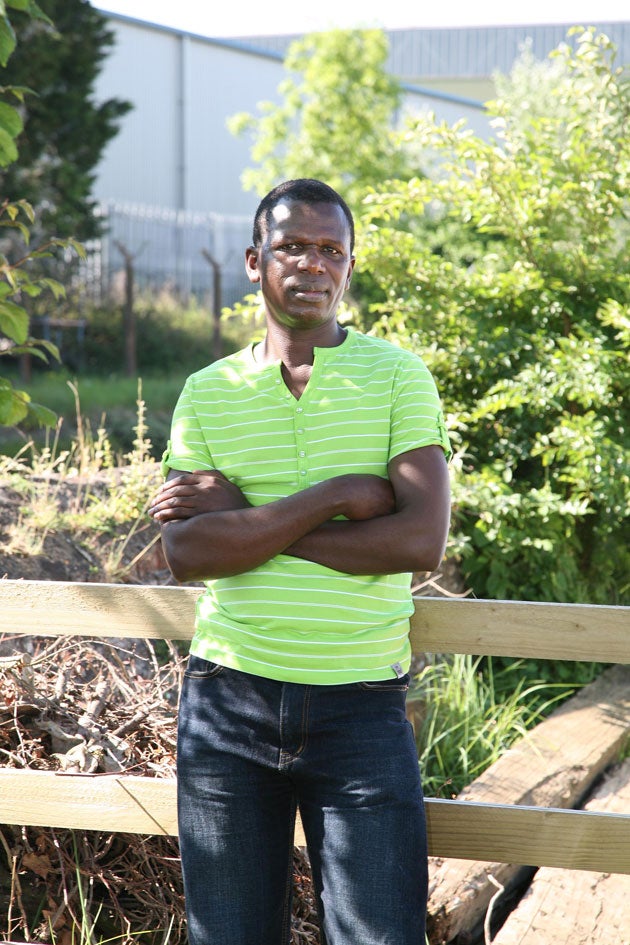Government to face legal action by returned asylum-seeker
Gay man's deportation to Uganda is overturned by High Court judge. Emily Dugan reports

Your support helps us to tell the story
From reproductive rights to climate change to Big Tech, The Independent is on the ground when the story is developing. Whether it's investigating the financials of Elon Musk's pro-Trump PAC or producing our latest documentary, 'The A Word', which shines a light on the American women fighting for reproductive rights, we know how important it is to parse out the facts from the messaging.
At such a critical moment in US history, we need reporters on the ground. Your donation allows us to keep sending journalists to speak to both sides of the story.
The Independent is trusted by Americans across the entire political spectrum. And unlike many other quality news outlets, we choose not to lock Americans out of our reporting and analysis with paywalls. We believe quality journalism should be available to everyone, paid for by those who can afford it.
Your support makes all the difference.The Home Office is facing legal action after it forcibly deported a gay Ugandan asylum-seeker when his case was still under review. John Bosco Nyombi is now seeking damages against the Government after British judges ruled that his removal was "manifestly unlawful" and ordered his return.
The case will embarrass Jacqui Smith, the Home Secretary, over its suggestion that casual cruelty and inefficiency are at the heart of the British asylum system.
Speaking for the first time since arriving back in the UK, Mr Nyombi told the IoS: "The last year has been torture. I've never done anything wrong and what the Home Office did was illegal. All the things I went through are because of them."
The 38-year-old originally fled to Britain in 2001, fearing that being gay – which in Uganda can result in life imprisonment or even death – put his life in danger. He had an outstanding application for a judicial review on his case when he was taken by four security men and bundled on to a flight to Kampala on 18 September 2008. When he tried to resist and ask for a lawyer, the British removal officers allegedly dragged him by the handcuffs and struck him in the groin and shoulder.
Just two days earlier, Mr Nyombi's face had been on the front page of a Ugandan national newspaper "outing"him as a homosexual and reporting on his fight to stay in the UK. Within moments of his arrival in Kampala, he was abandoned by the British officers who had accompanied him on the flight, leaving him to be interrogated by border police who had seen the article and wanted to arrest him.
He managed to escape a first arrest after paying a bribe. The former careworker then endured six months in hiding before the Home Secretary secured his release, twice getting caught and put into prison where he was violently beaten by both staff and inmates for his sexuality.
On hearing the circumstances of Mr Nyombi's removal from the UK, a deputy High Court judge, Sir George Newman, said the Home Office was guilty of "a grave and serious breach" of the law. The judge also ruled that Mr Nyombi had been "deliberately misled" on the day of his removal. He was told that he was being taken from Tinsley House removal centre "for an interview". Instead he was taken to Gatwick airport. The guards gave him no opportunity to contact friends or lawyers, even though Home Office rules state he should have 72 hours' notice to allow time for calls.
In a final insult, when Mr Nyombi finally arrived back in the UK on 6 March, he spent three days being held in immigration detention because of a "miscommunication". This was despite an arrangement made with the Home Office that he would stay with friends following his ordeal.
Mr Nyombi, who was known as "Mr X" while his lawyers fought to bring him back to the UK, has now won his asylum appeal and is back in Southampton staying with a friend. Once his immigration papers come through, his old job as a carer in a local nursing home is waiting for him.
Nick Armstrong, Mr Nyombi's barrister at Matrix Chambers, said: "It is very rare to have the Home Secretary ordered to return someone. It happened here because of the quite extraordinary catalogue of errors. The Home Office used a policy which was unlawful. It really could not have gone more wrong, and betrays a worryingly casual attitude towards matters of fundamental rights, including access to lawyers."
After fleeing his country, fighting a seven-year immigration battle and suffering a further six months in Uganda in fear of his life, safety has come at a great cost for Mr Nyombi. "I think I've lost a lot of things," he said. "I've lost time and I have been stopped from working. I want to rest now, I want peace. For the last five years, I've been wondering what will happen tomorrow. For the first time, I won't have to worry about that."
Despite his ordeal, he is careful not to tar Britain with the mistakes of its government. "Although I've had a rough time, I'll never say it was Britain that did it to me, but always the Home Office. Without the friends I have here, I wouldn't have survived."
Caroline Slocock, chief executive of Refugee and Migrant Justice, said: "The sad truth is that without the intervention of a High Court judge, he would be there now. This appalling case illustrates how vital it is that adequate scrutiny is maintained."
Join our commenting forum
Join thought-provoking conversations, follow other Independent readers and see their replies
Comments